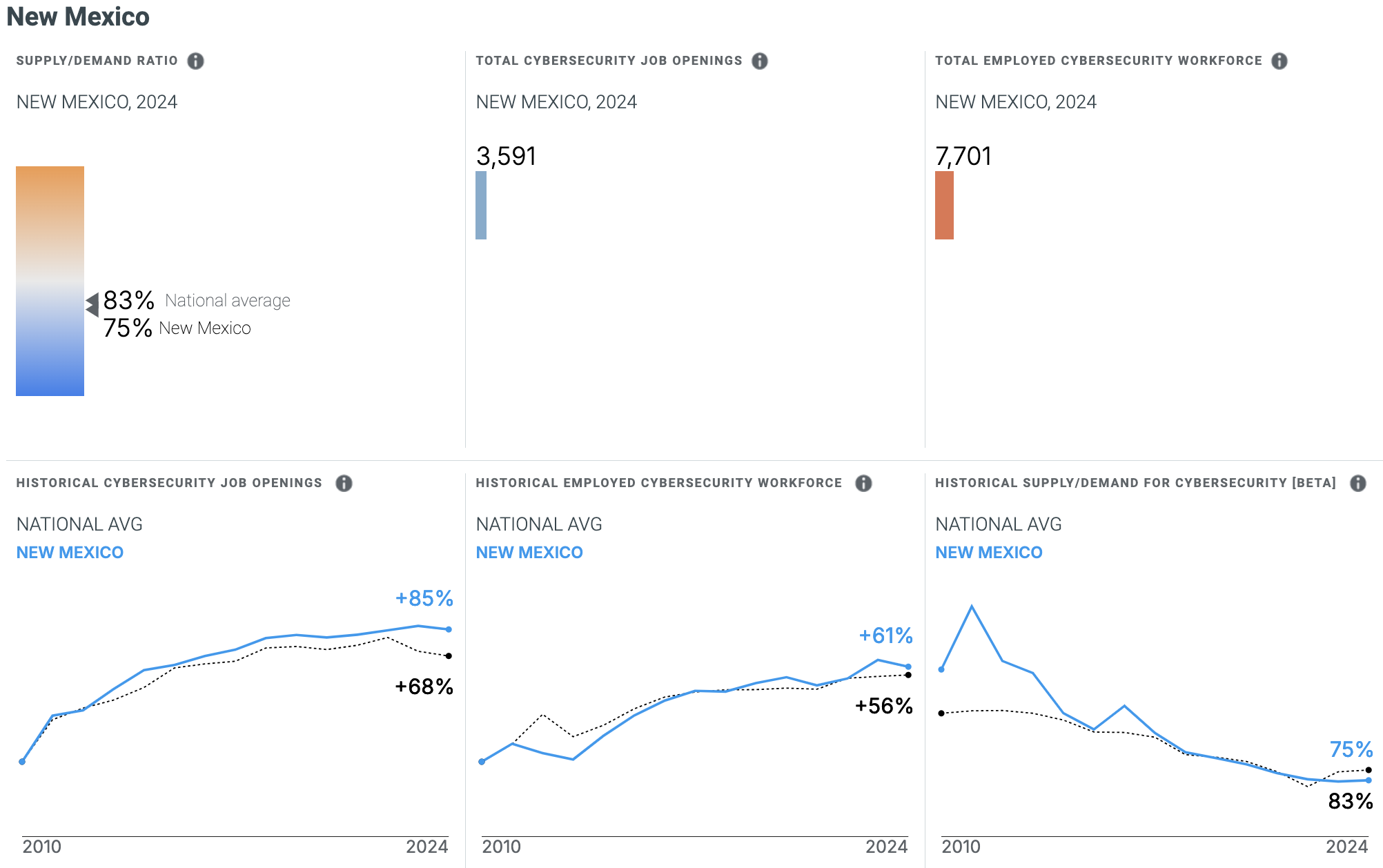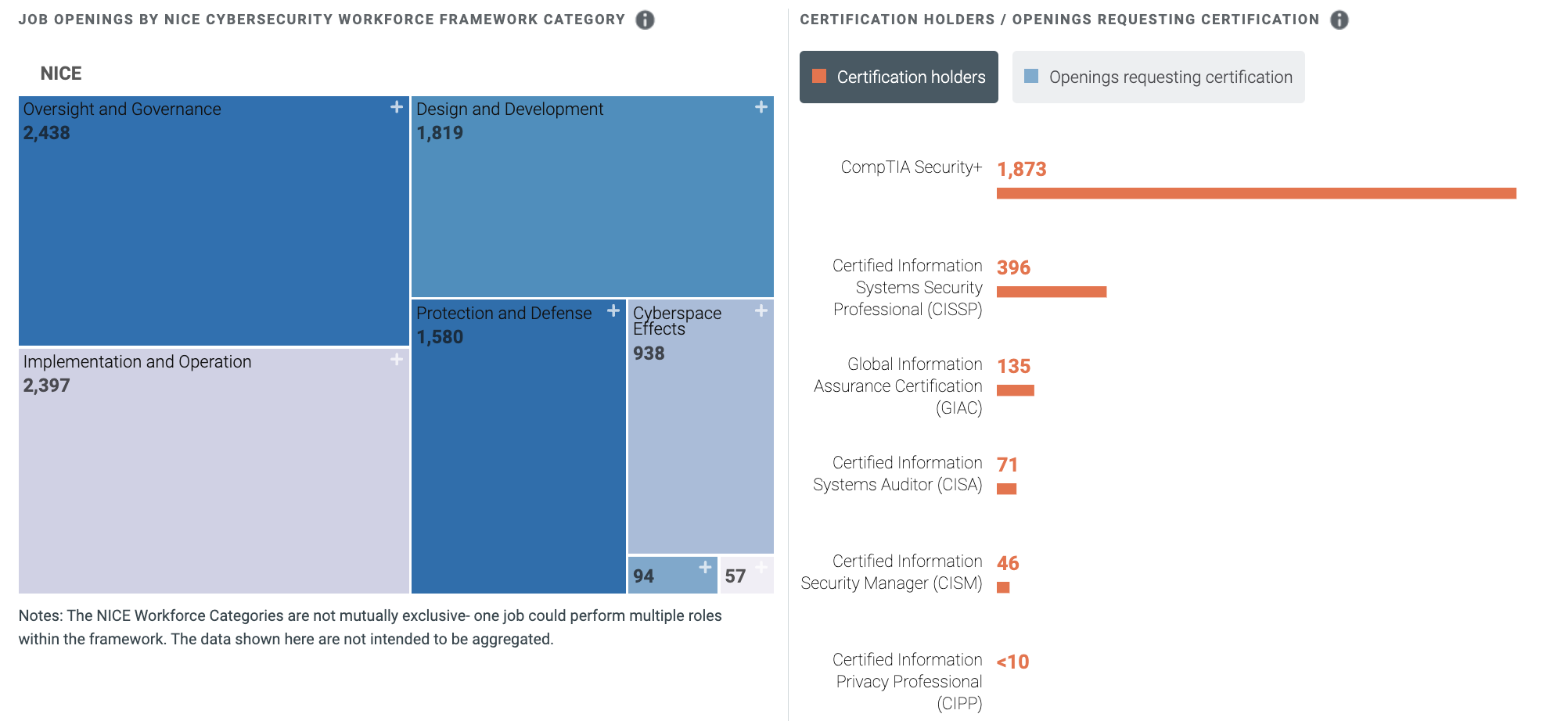- Associate degree
- Bachelor’s degree
- Master’s degree
- Cybersecurity certifications
- Cybersecurity in New Mexico
- Jobs in New Mexico
This guide covers cybersecurity schools in New Mexico and is designed to overview the cybersecurity career opportunities in the “Land of Enchantment.”
New Mexico’s cybersecurity scene is growing rapidly, thanks to several factors, including the state’s strong research and development capabilities, thriving startup ecosystem, and commitment to cybersecurity education.
New Mexico is a hub for cybersecurity research, development, and education. Local companies are developing cutting-edge technologies and solutions to combat cyber threats, and they are also training the next generation of cybersecurity professionals.
Ad
cybersecurityguide.org is an advertising-supported site. Clicking in this box will show you programs related to your search from schools that compensate us. This compensation does not influence our school rankings, resource guides, or other information published on this site.
Featured Cybersecurity Degree Programs
| School Name | Program | More Info |
|---|---|---|
| Grand Canyon University | Online BS in Cybersecurity or Online MS in Cybersecurity | website |
| Arizona State University | Online MA in Global Security - Cybersecurity | website |
| Southern New Hampshire University | Online BS in Cybersecurity or Online MS in Cybersecurity | website |
| Syracuse University | Online MS in Cybersecurity | Complete in 15 Months | website |
| Utica University | Online BS in Cybersecurity | website |
| Purdue Global | Online BS in Cybersecurity | website |

Cybersecurity development in New Mexico
New Mexico may not be very populated, but that doesn’t mean a lot is going on. The state is home to several major energy economic drivers, as it supplies oil, natural gas, and solar power to the surrounding state and beyond.
It’s also home to several Air Force bases, providing multiple opportunities for employment by the government. The presence of these Air Force bases reinforces the need for national security on a statewide level, causing colleges to double down on their cybersecurity offerings.
One of the key drivers of cybersecurity development in New Mexico is the state’s strong research and development capabilities. Sandia National Laboratories, Los Alamos National Laboratory, and New Mexico Tech are all leading centers for cybersecurity research.
These institutions are developing new technologies and solutions to protect against cyber threats, such as artificial intelligence-powered security analytics, quantum-resistant cryptography, and blockchain-based security platforms.
Several startups are also developing innovative cybersecurity solutions, such as cloud security, network security, and application security. These startups are attracting investment from venture capitalists and other investors, and they are helping to create new jobs in the state.
Related resources
Here are some of the cybersecurity organizations in New Mexico:
- New Mexico Cybersecurity Center of Excellence (NMCCoE) – A development center for cybersecurity research and education. It is located at New Mexico Tech and partners with other universities, colleges, and businesses in the state to promote cybersecurity awareness and develop new technologies to protect against cyber threats.
- CyberReady New Mexico – Statewide consortium and initiative that strives to improve cybersecurity pathways for students and research. It offers a variety of programs and resources, including networking events, educational workshops, and advocacy efforts.
- New Mexico Technology Council (NMTC) Cybersecurity Peer Group – A professional organization that connects local professionals and organizations to share resources and technologies in the fight against cyber threats. Members have access to information, events, and workforce development programs.
- ISACA New Mexico Chapter – A global association of information systems control, audit, risk, and security professionals. The New Mexico chapter unites local cybersecurity professionals in a supportive network. Members take part in meetings to discuss current events and developments. They also have access to events, workshops, and seminars.
Cybersecurity education in New Mexico
Cybersecurity education is important in New Mexico because the state is home to several critical infrastructure systems, such as the electric grid and the financial system. These systems are increasingly vulnerable to cyberattacks, and cybersecurity professionals are needed to protect them.
In addition, New Mexico is a hub for cybersecurity research and development. The state is home to Sandia National Laboratories and Los Alamos National Laboratory, which are two of the leading research institutions in the world in cybersecurity.
These institutions are developing new technologies and solutions to protect against cyber threats, and they need a skilled workforce to implement these solutions.
Cybersecurity associate degrees in New Mexico
When studying cybersecurity, an associate degree is often the best place to start. These degrees can provide students with a foundation of computer science and cybersecurity knowledge without getting too technical or specific.
- Program: AAS Cyber Security
Credits: 62
Cost per credits: $179
Delivery method: Online
Learn more: Program details - Program: Associate of Applied Science in Information Systems Cybersecurity
CAE designation: CAE-CD
Credits: 63
Cost per credit: $53 in state | $106 out of state
Delivery Method: Campus
Learn more: Program details - Program: Online Information Technology Associate Program - Computer Security
Credits: 93
Cost per credits: $380
Delivery method: Online
Learn more: Program details - Program: Associate of Applied Science in Information Technology – Cybersecurity Emphasis
Credits: 60-62
Cost per credit: $140 in-state | $371 out of state
Delivery method: Campus
Learn more: Program details
Cybersecurity bachelor’s degrees in New Mexico
Bachelor’s degrees are the next step up after associate-level degrees. They provide more specific and detailed cybersecurity knowledge to all students who take their programs.
Some programs allow you to specialize in one aspect of cybersecurity or combine your cybersecurity interest with another field like forensics or criminology. Bachelor’s degrees are usually the first certification you need to get a job in the cybersecurity field.
- Program: Bachelor of Science Degree in Information Technology – Security and Assurance Track
Credits: 120
Cost per credit: $308 in-state | $883 out-of-state
Delivery method: Campus
Learn more: Program details - Program: Bachelor of Information and Communication Technology (ICT) - Cybersecurity concentration
Credits: 120
Cost per credit: $395
Delivery method: Online
Learn more: Program details - Program: Bachelor’s Degree in Cyber Security (BSCS)
Credits: 60
Cost per credit: $465.00
Delivery method: Online
Learn more: Program details
Cybersecurity master’s degrees in New Mexico
Master’s degrees are perfect for those who want to specialize even further in the area of cybersecurity or those who want to be better qualified for higher-paying positions. Many top-level cybersecurity jobs are only available to those with years of experience or master’s degrees.
- Program: Master’s in Cyber Security (MSCS)
Credits: 36
Cost per credit: $540
Delivery method: Online
GRE Requirement: Not required
Learn more: Program details - Program: Cybersecurity and Business Analytics (MS-CBA)
CAE designation: CAE-R
Credits: 33
Cost per credit: $805
Delivery method: Online
GRE Requirement: Not required
Learn more: Program details

Cybersecurity certifications in New Mexico
Certificates for cybersecurity can be valuable both to beginners and those with some experience under their belts.
Certificates can be pursued to learn a new specific skill within the cybersecurity sphere or to obtain certification so you can take a specific position at a company or agency. You can also use certificate programs to get a taste of the field and see if you want to pursue it further.
- Program: Certificate in Computer & Network Security
CAE designation: CAE-CD
Credits: 21
Cost per credit: $53 in state | $106 out of state
Delivery method: Campus
Learn more: Program details - Program: Computer and Network Security Certificate
Credits: 22
Cost per credit: $49 in state | $144 out of state
Delivery method: Campus
Learn more: Program details
Cybersecurity jobs in New Mexico
New Mexico isn’t a very populated state outside of its major metropolitan areas, but it does have a few major economic centers that demand high digital security.
As a result, CyberSeek shows us that New Mexico currently employs about 7,701 cybersecurity workers, with another 3,591 open positions at this time.
In other words, there’s plenty of demand for cybersecurity workers relative to the overall population of the state even though the number of open positions seems small. This means that there are fewer positions available than in a state like California, but each position will likely be filled quickly as soon as a suitable applicant comes along.
New Mexico is thus a great state for qualified cybersecurity graduates looking for ample employment opportunities.
Another thing to consider is that New Mexico’s cost of living ranked as about 88.4 with a national standard of 100. In a nutshell, New Mexico is a very affordable state and every dollar you earn will go further than it would in a more expensive state.
How much can cybersecurity professionals expect to earn? In New Mexico, the average hourly salary for cybersecurity workers is $61.47 and the average annual salary is $127,860, according to the Bureau of Labor Statistics. In short, New Mexico is a great state to be a cybersecurity employee if you want to make lots of money!
New Mexico and cybersecurity
Overall, there aren’t as many educational opportunities for cybersecurity in New Mexico compared to several other states, but there are lots of opportunities for worthwhile employment due to the spread of available jobs and a low number of current employees.
In terms of actual salary value, New Mexico may be one of the most profitable in the country.